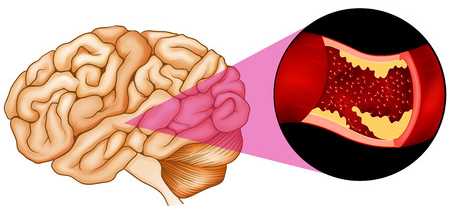Symptoms, remedies, treatments and care for Stroke
Stroke
 Stroke occurs when blood flow to an area of brain is cut off. When this happens, brain cells are deprived of oxygen and nutrients and will start to die within minutes. When brain cells die during a stroke, abilities controlled by that area of the brain such as memory and muscle control are lost. A small stroke may only cause minor problems such as temporary weakness of an arm or leg. A larger stroke can permanently paralyze one side of patient's body. The exact location of the stroke also determines the damage that occurs to the nervous system. Some people recover completely from strokes, but most survivors will have some type of disability.
Stroke occurs when blood flow to an area of brain is cut off. When this happens, brain cells are deprived of oxygen and nutrients and will start to die within minutes. When brain cells die during a stroke, abilities controlled by that area of the brain such as memory and muscle control are lost. A small stroke may only cause minor problems such as temporary weakness of an arm or leg. A larger stroke can permanently paralyze one side of patient's body. The exact location of the stroke also determines the damage that occurs to the nervous system. Some people recover completely from strokes, but most survivors will have some type of disability. Symptoms of stroke include sudden numbness or weakness of face, arm or leg, especially on one side of the body; trouble speaking or seeing; confusion; loss of balance; dizziness and severe headache.
About 85 percent of strokes are ischemic strokes. Ischemic strokes occur when the arteries to the brain become narrowed or blocked, causing severely reduced blood flow. There are two main types of ischemic strokes - thrombotic stroke and embolic stroke. A thrombotic stroke occurs when a blood clot (thrombus) forms in one of the arteries that supply blood to your brain. A clot may be caused by fatty deposits (plaque) that build up in arteries and cause reduced blood flow (atherosclerosis) or other artery conditions. An embolic stroke occurs when a blood clot or other debris forms away from the brain, commonly in the heart, to be swept through your bloodstream to lodge in narrower brain arteries. This type of blood clot is called an embolus.
Another type of stroke is hemorrhagic stroke. Hemorrhagic stroke occurs when a blood vessel in the brain leaks or ruptures. Brain hemorrhages can result from many conditions that affect blood vessels, including uncontrolled high blood pressure (hypertension), overtreatment with anticoagulants and weak spots in the blood vessel walls (aneurysms). There are two main types of hemorrhagic stroke - intracerebral hemorrhage and subarachnoid hemorrhage. In an intracerebral hemorrhage, a blood vessel in the brain bursts and spills into the surrounding brain tissue, damaging brain cells. Brain cells beyond the leak are deprived of blood and also damaged. High blood pressure, trauma, vascular malformations, use of blood-thinning medications and other conditions may cause an intracerebral hemorrhage. In a subarachnoid hemorrhage, an artery on or near the surface of the brain bursts and spills into the space between the surface of the brain and skull. The bleeding is often signaled by a sudden, severe headache. A subarachnoid hemorrhage is commonly caused by the bursting of a small sack-shaped or berry-shaped outpouching on an artery known as an aneurysm. After the hemorrhage, the blood vessels in the brain may widen and narrow erratically (vasospasm), causing brain cell damage by further limiting blood flow.
A transient ischemic attack (TIA), a.k.a. ministroke, is a brief period of symptoms similar to a stroke. A temporary decrease in blood supply to part of the brain causes TIAs, and it often lasts less than five minutes. Like an ischemic stroke, a TIA occurs when a clot or debris blocks blood flow to part of the brain. A TIA doesn't leave lasting symptoms because the blockage is temporary.
A stroke is a medical emergency, regardless of whether it is a major stroke or a short-lasting TIA. The key to survival and recovery is prompt medical treatment. Early action can minimize brain damage and potential complications.
Remedies:
4.1




 (13)
(13)




 (13)
(13)
Effectiveness: 4.1 Popularity: 13
3.6



 (10)
(10)



 (10)
(10)
Effectiveness: 3.6 Popularity: 10
3.1



 (10)
(10)



 (10)
(10)
Effectiveness: 3.1 Popularity: 10
3.3



 (8)
(8)



 (8)
(8)
Effectiveness: 3.3 Popularity: 8
3.8



 (6)
(6)



 (6)
(6)
Effectiveness: 3.8 Popularity: 6
3.2



 (5)
(5)



 (5)
(5)
Effectiveness: 3.2 Popularity: 5
3.6



 (3)
(3)



 (3)
(3)
Effectiveness: 3.6 Popularity: 3
3.1



 (3)
(3)



 (3)
(3)
Effectiveness: 3.1 Popularity: 3
3.8



 (2)
(2)



 (2)
(2)
Effectiveness: 3.8 Popularity: 2
2.4


 (2)
(2)


 (2)
(2)
Effectiveness: 2.4 Popularity: 2
3.0


 (1)
(1)


 (1)
(1)
Effectiveness: 3.0 Popularity: 1
Effectiveness: N/A Popularity: 0
Cannot find information on an ailment or condition? Submit it to our system